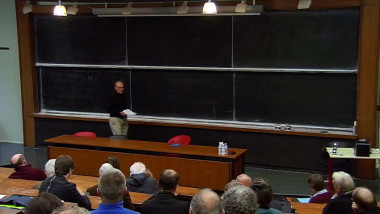Quantifying the evolutionary advantage of recombination in finite populations
De Denis Roze
Apparaît dans la collection : 2022 - T1 - WS3 - Mathematical models in ecology and evolution
One of the most widely cited hypotheses to explain the evolutionary maintenance of sex and recombination states that recombination increases the efficiency of natural selection by reducing interference among selected loci. Until recently, this possible benefit of re-combination was quanti˝ed analytically only in the case of haploid, randomly mating organisms, with selection acting at a few loci only. In this talk, I will present recent analytical and simulation results quantifying the strength of selection for recombination along continuous chromosomes infinite, diploid populations. Interestingly, selection for recombination caused by recurrent deleterious mutations can often be approximated by a simple function of the effective population size and the chromosomal mutation rate and genetic map length (average number of crossovers at meiosis). The results will then be ex-tended to the case of partially inbred populations (by considering partially self-fertilizing hermaphroditic organisms), and to the effect of transposable elements, representing an important source of mutation in the genomes of eukaryotes.












